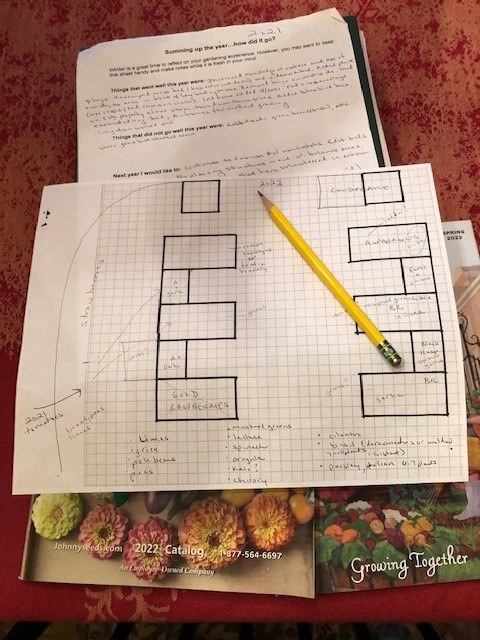Posted: January 14, 2022
Late winter and early spring are great times to reflect on the past year in your garden.

Trellises help add extra growing space to a suburban vegetable garden.
Some years are better than others. No matter how seasoned the gardener, evaluation opens the door for learning and improving our skills.
Here are a couple prompts to help you get started:
- Things that went well this year were …
- Things that did not go well this year were …
Keeping written notes like "Consider taking a year off from tomatoes" or "Pole beans were good but started slowly" can help you adjust planting for the next season. Repeatedly growing the same plant family in the same place can create a cycle of disease that negatively impacts both the health and yield of the plant. Master Gardeners offer tips on rotating families and planning a vegetable garden.
Consider creating a two-dimensional sketch of the garden on graph paper. After outlining the garden, make several copies to use in future seasons. Note the perennial flowers or perennial crops such as asparagus, rhubarb, or strawberries to remind you of areas not available for annual vegetables and herbs. Adding the bed's measurements can also provide a gentle reminder that space truly is limited in some areas.

Time invested in planning your garden can help you save money and see better results. Available planning tools range from detailed computer programs to a simple pencil and paper sketch. Photo credit: Christa Shoreman
Look at your vegetable garden (or photographs of it if you have removed debris) when the plants are mature. This helps determine if you placed seeds too closely together, if plants stretched for light, heavily competed with adjacent plants, or if your pathways need to be widened to allow better access for weeding and watering.
If you are a new vegetable grower, you may feel unsure where to start. Begin with a limited number of foods that you enjoy and that you have space for. Penn State Extension has more on beginning a vegetable garden.
One of the biggest mistakes a new gardener can make is treating vegetables and herbs the same way as perennials, particularly when fertilizing and watering. Typically, the first year for perennials is the most critical, and after that, watering is needed only during dry periods.
Most vegetables, especially raised beds or containers, need more irrigation than rain provides. If you touch the side of a plastic pot on a sunny day and it feels warm, that side is above body temperature, 98.6 degrees.
Roots of potted plants must tolerate much warmer temperatures than those in the ground. The temperature may be even higher if the container is on a dark surface such as asphalt. Soaker hoses and timers can be tools that help heatproof your garden when they need it.

Dried stalks of asparagus and a newly-constructed trellis. Photo credit: Christa Shoreman
Most annual vegetables reach maturity relatively quickly compared to herbaceous perennials, shrubs, or trees. They need lots of the sun's energy to grow rapidly, and nutrient-rich soil is necessary. If you are planting vegetables on your site for the first time, Penn State suggests testing the soil fertility to determine what nutrients are or are not needed. Compost or leaf litter will improve soil quality and structure. Here is more information on managing soil structure by Penn State.
Another critical step is determining the correct time to plant your seeds or seedlings. Because weather patterns are unpredictable, most guides will have ranges or approximations because the last spring frost date can vary from year to year. Be patient, and take advantage of guidance from planting guides.
As the season progresses, especially if you are a novice, revisit the beginning statements of this article. Make notes for yourself, but store them where you can find them. The notes can be kept in the notes section on your phone, a binder, notebook, or dedicated garden journal. Think about the upcoming season using the prompt, "Next year I would like to…"
With good planning and care, you will succeed growing vegetables in the garden. Experiment, be patient, and have fun. Always be sure to make notes for next year.
Printed in Lancaster Farming, January 14, 2022
by Christa Shoreman

